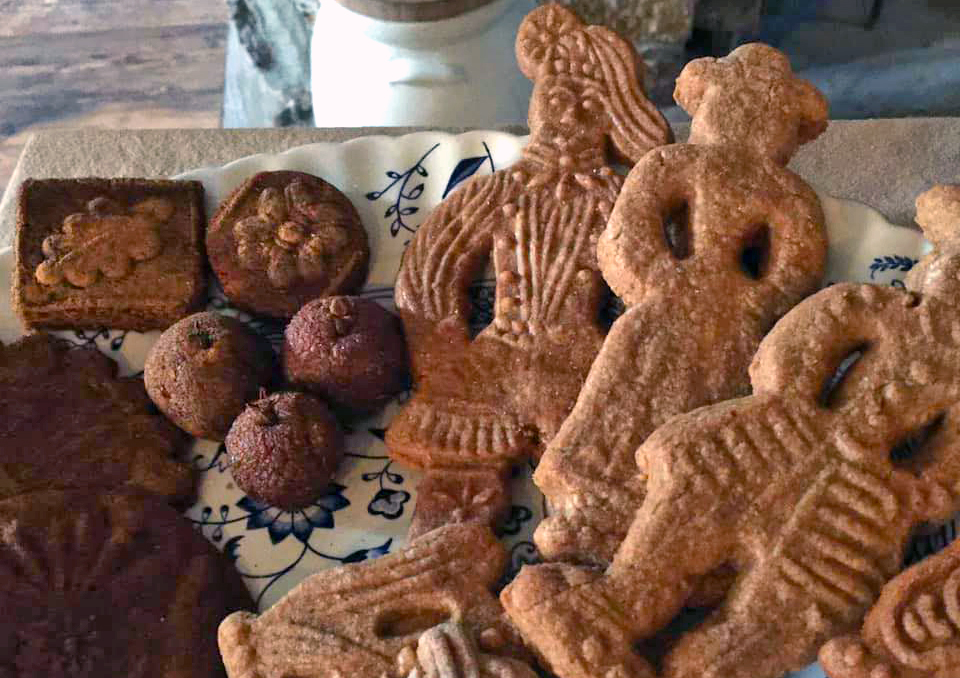
Washington Crossing Historic Park historical interpreters will bake gingerbread during Washington’s birthday party on February 16. To see them in action, stop into the Hibbs House in the Historic Village during the celebration, which runs from noon to 4 PM.
Gingerbread’s history dates back to medieval times, when it was thought to be medicinal cure for “coughs and infirmities of the lungs.” Medieval gingerbread would hardly be recognizable to us today as its main sweetener was honey rather than molasses.
Gingerbread was popular in the colonial era, too. Early 18th-century recipes commonly called for the addition of caraway and anise seeds, as well as candied fruit and peel. Accounts from the period note that gingerbread could be kept for half a year.
Amelia Simmons’ Gingerbread
In the first American cookbook, published in 1796, Amelia Simmons offered several variations of gingerbread. Here’s one of them:
Three pounds of flour, a grated nutmeg, two ounces ginger, one pound sugar, three small teaspoons pearl ash dissolved in cream, (modern equivalent would be ½ tsp. baking soda to 1 tsp pearl ash) one pound butter, four eggs, knead it stiff, shape it to your fancy, bake 15 minutes
Today’s bakers can follow this modern-day version of the recipe:
- 6 cups flour
- 1 grated nutmeg
- 2 oz. ginger
- 2 cups sugar
- 3 tsp. baking soda dissolved in ¼ cup cream
- 1 pound of butter
- 4 small eggs
Cream the butter and sugar, then add the eggs. Add the baking soda dissolved in cream. Stir in all dry ingredients and knead until stiff. Roll out ½ inch thick and cut into desired shapes or squares. Bake for 15 minutes at 350 degrees.
Cake-Like Gingerbread
Another form of gingerbread creates a more cake-like treat. This version can be found in a cookery book by American author Miss Eliza Leslie, born in Philadelphia. Eliza attended Mrs. Goodfellow’s cooking school, circa early 1800s. While there as a pupil, she compiled a collection of receipts.
Eliza’s version may have been the type of gingerbread served to the Marquis de Lafayette in 1784 by Mary Ball Washington, the General’s mother, although this version still it is quite different than the product we have become accustomed to today.
Eliza’s version is as follows: Cut up in a pan ½ cup of the very best fresh butter with ½ cup of excellent brown sugar, beat to a cream with a paddle. Add 1 cup of West India molasses and ½ cup of warm milk; 2 Tablespoons of powdered ginger and 1 heaping teaspoon of cinnamon, mace and nutmeg powdered and mixed 1 wine glass or brandy. Beat 3 eggs till very light and thick: 3 cups of flour and 1 teaspoon of cream of tartar sifted with flour and stirred alternately beaten into the batter. Last, mix in the juice and grated rind of 1 large orange. Dissolve 1 teaspoon of soda in a little warm water and stir. Beat until very light. A cup of full of seeded raisins is an addition. Bake in a loaf or sheet pan in a moderate oven.
If you’d like to make this version in your kitchen, here’s what you’ll need to do:
- 1 egg, well beaten
- ½ cup sugar
- ½ cup molasses
- ¼ cup butter
- 2 cups cake flour
- ½ cup hot water (instead of brandy)
- 1 tsp. ginger
- 1 tsp. cinnamon
- ¼ mace
- 1 tsp. baking soda
- 1 tablespoon grated orange rind
Combine the egg, sugar and molasses and beat well. Mix the butter into hot water and stir until it’s melted. Add the butter mixture to the egg mixture. Sift in all the dry ingredients until well blended and pour the entire mixture into a greased square pan. Bake at 350 degrees for about 15 minutes.

